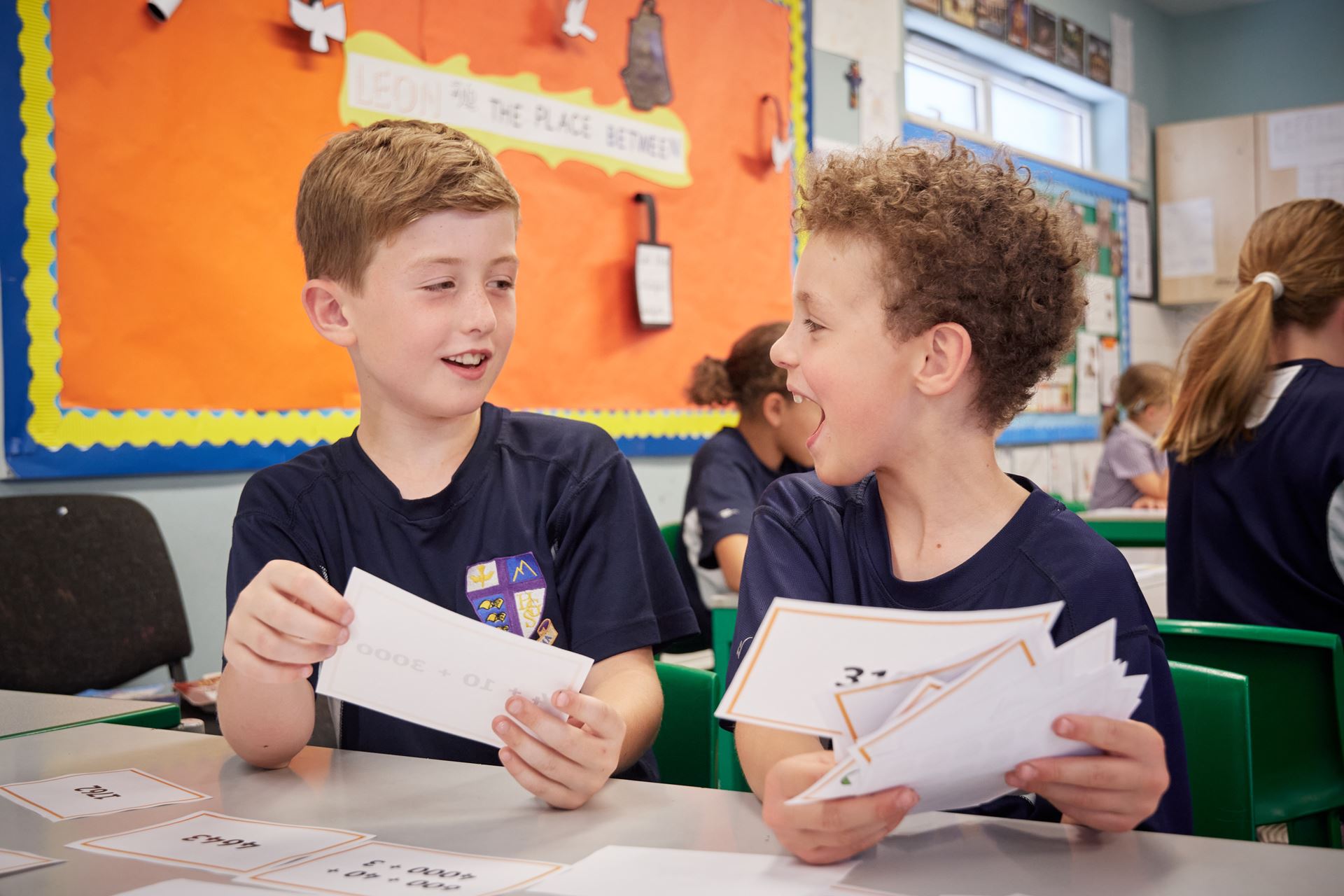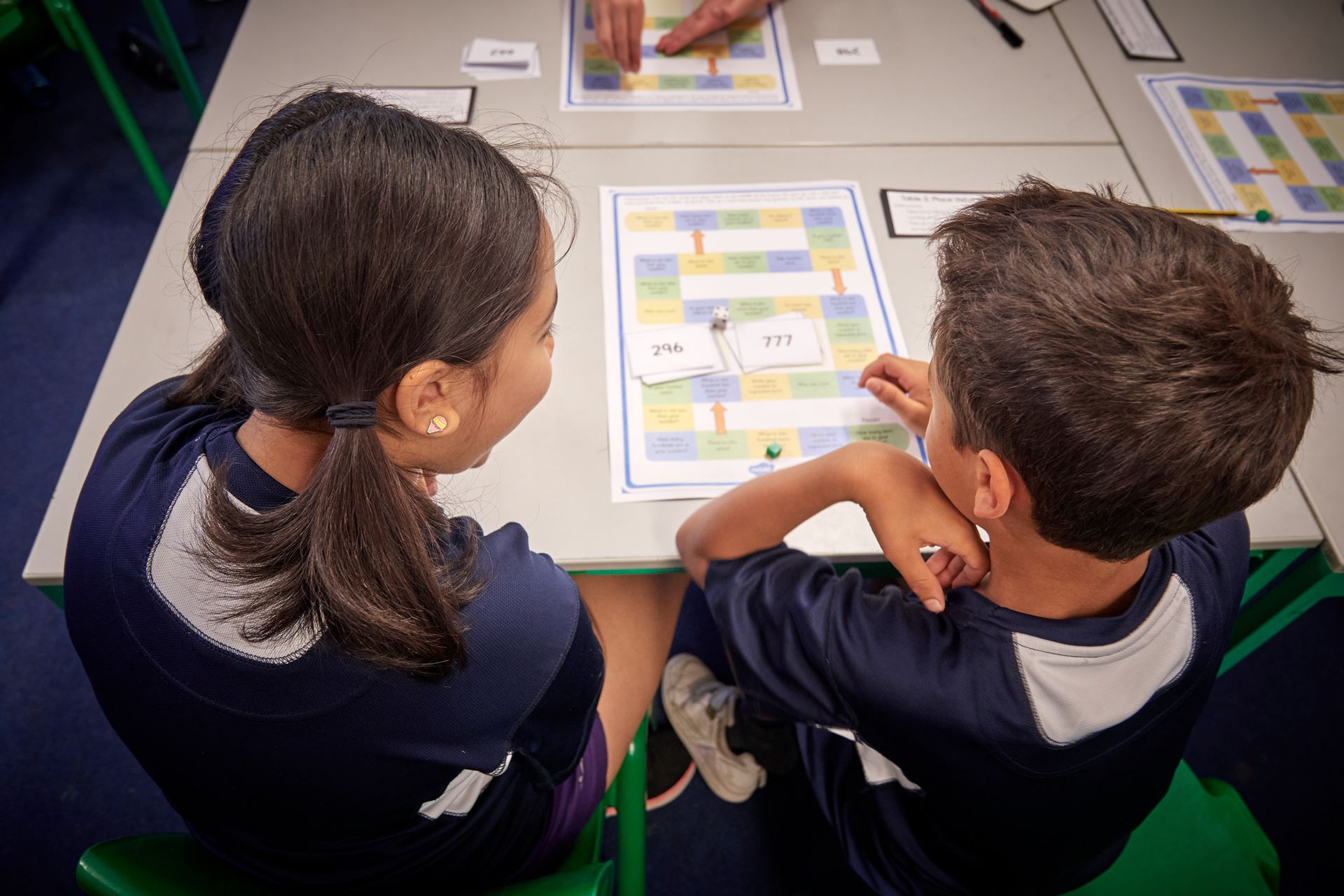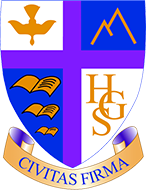Mathematics
All children can achieve in mathematics and we work hard to ensure children acquire fluency in key facts and concepts and are given opportunities to develop their reasoning and problem-solving skills in every lesson, in line with the aims of the National Curriculum.
Intent
Fluency is crucial as solid conceptual understanding and the ability to recall knowledge rapidly and accurately frees up the mind for deeper mathematical thinking. Children at Holy Ghost are taught to reason mathematically by making connections between different aspects of their learning, following a line of enquiry, justifying their thinking and making generalisations using mathematical language. Well-developed reasoning skills form the basis of effective problem-solving. Children are taught to solve problems by applying their conceptual understanding to a variety of routine and non-routine problems with increasing sophistication, including breaking down problems into a series of simpler steps and persevering in seeking solutions.
frees up the mind for deeper mathematical thinking. Children at Holy Ghost are taught to reason mathematically by making connections between different aspects of their learning, following a line of enquiry, justifying their thinking and making generalisations using mathematical language. Well-developed reasoning skills form the basis of effective problem-solving. Children are taught to solve problems by applying their conceptual understanding to a variety of routine and non-routine problems with increasing sophistication, including breaking down problems into a series of simpler steps and persevering in seeking solutions.
Through this approach, we aim to instil in children a life-long grasp of and appreciation for mathematics.
Implementation
Our maths lessons are carefully sequenced using a logical small-steps approach to teaching new concepts by building on previous learning. These lessons are supplemented by WhiteRose Maths, NCETM, Nrich, and Classroom Secrets. Using a mastery approach our mathematics curriculum carefully sequences knowledge, concepts and procedures to build mathematical knowledge and skills systematically over time. The curriculum provides sufficient opportunities for planned revisits of previously learned knowledge, concepts and procedures; this is to ensure that, once learned, mathematical knowledge becomes deeply embedded in pupils’ memories; freeing pupils’ attention to work with independence and apply their mathematical knowledge to more complex mathematics.
 Children are given opportunities to develop their understanding by exploring mathematics with concrete resources and visual representations. Within lessons, there is an emphasis on quality mathematical talk and the correct use of mathematical language. Fluency is developed through regular opportunities to retrieve basic number facts and explore efficient strategies. The enhancement of problem-solving and reasoning skills is seen as a crucial part of each lesson. Those pupils behind age-related expectations are supported with pre-teaching, small-group interventions and targeted support in lessons. Children who grasp concepts rapidly are challenged with greater-depth problems.
Children are given opportunities to develop their understanding by exploring mathematics with concrete resources and visual representations. Within lessons, there is an emphasis on quality mathematical talk and the correct use of mathematical language. Fluency is developed through regular opportunities to retrieve basic number facts and explore efficient strategies. The enhancement of problem-solving and reasoning skills is seen as a crucial part of each lesson. Those pupils behind age-related expectations are supported with pre-teaching, small-group interventions and targeted support in lessons. Children who grasp concepts rapidly are challenged with greater-depth problems.
Teachers assess progress in mathematics in a range of ways. During lessons, formative assessment is employed to judge children’s level of understanding through questioning, listening to pupil talk and monitoring work. Any misconceptions thus identified are then addressed promptly. End-of-unit assessments are conducted to ascertain overall attainment in a topic and at the end of each term, summative assessment takes place in the form of tests. The information gained through these processes feeds into the planning of subsequent lessons and informs interventions put in place to support those children who are not currently meeting the expected standard.
Impact
Children at Holy Ghost have a positive view of maths due to learning in an environment where the subject is promoted as being an exciting subject in which they can investigate and ask questions while being supported to develop their understanding in a range of ways.
The ultimate impact of all the above is for every child to achieve a deep and lasting understanding of and appreciation for mathematics. Children will understand the relevance of what they are learning in relation to real-world concepts. They will appreciate that maths is a vital life skill they will rely on in many areas of their daily life.
Curriculum Overview for Mathematics
Reception Curriculum Overview 2023-2024
Year 1 Curriculum Overview 2023-2024
Year 2 Curriculum Overview 2023-2024
Year 3 Curriculum Overview 2023-2024
Year 4 Curriculum Overview 2023-2024

